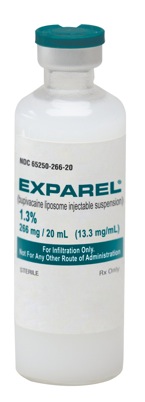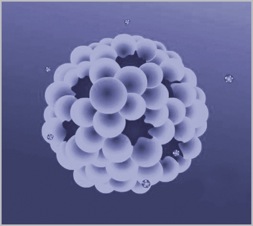Pacira Pharmaceuticals, Inc.

Pacira Pharmaceuticals, Inc. is an emerging specialty pharmaceutical company focused on the clinical and commercial development of new products to address the needs of acute care practitioners and their patients. Pacira is driven by a dynamic workforce committed to optimizing patient care and satisfaction in the acute care setting, with a special focus on improving outcomes in postsurgical pain management.
A Proprietary Drug Delivery Platform
The cornerstone of the Pacira product portfolio is DepoFoam®, a proprietary drug delivery platform designed to extend a medication’s duration of action without altering its molecular structure. The DepoFoam carrier matrix is made up of multivesicular liposomes that encapsulate a drug. Each chamber is separated by lipid membranes that naturally erode to release the drug over a desired period of time.
At A GlanceAddress5 Sylvan Way For more information on EXPAREL, visit www.EXPAREL.com For medical inquiries related to EXPAREL, contact Medical Information at medinfo@pacira.com or 1-855-RX-EXPAREL (1-855-793-9727) |
A First of Its Kind, Single-Dose Local Analgesic
In 2012, Pacira successfully launched EXPAREL® (bupivacaine liposome injectable suspension), the first and only DepoFoam-based local analgesic. Indicated for administration into the surgical site to produce postsurgical analgesia, a single dose of EXPAREL provides nonopioid pain control with reduced opioid requirements for up to 72 hours* without the need for catheters or pumps.1
Shifting the Postsurgical Pain Management Paradigm
The launch of EXPAREL is bolstered by a robust Phase IV clinical program, which builds a compelling case for EXPAREL as the foundation of an opioid-sparing multimodal postsurgical pain management regimen. Recently published national and regional retrospective analyses2,3 of more than 350,000 postsurgical patients receiving opioids concluded that those who experienced opioid-related adverse events had both longer hospital lengths of stay and higher hospitalization costs. The company’s efforts are buoyed by a groundswell movement led by government and independent health care organizations to mitigate potentially fatal side effects related to opioid use by recommending a shift toward opioid-sparing pain regimens, especially in high-risk postsurgical patients.
Clinical Utility Across a Broad Range Of Potential Applications

EXPAREL has broad applications across multiple surgical specialties, as well as in the anesthesiology arena, including use as an infiltration into the transversus abdominis plane for postsurgical analgesia following abdominal procedures. In May, Pacira submitted a Supplemental New Drug Application to the FDA for a nerve block indication for EXPAREL based on positive data from a Phase III study assessing the safety and efficacy of EXPAREL in femoral nerve block for total knee arthroplasty.
The Pacira Advantage
Discovery, innovation and proprietary expertise are the hallmarks of the Pacira competitive advantage. The company not only holds the exclusive rights and expertise to DepoFoam, but owns the unique distinction of being the only company in the world with the ability to manufacture DepoFoam-based products, such as EXPAREL, on a large commercial scale. With steadily increasing demand and a growing list of potential clinical applications, Pacira and EXPAREL are poised to become vital fixtures in the postsurgical pain management arena.
For more information about Pacira Pharmaceuticals Inc., visit www.pacira.com.
*Pivotal studies have demonstrated the safety and efficacy of EXPAREL in patients undergoing hemorrhoidectomy and bunionectomy procedures.
Important Safety Information For EXPAREL

EXPAREL is contraindicated in obstetrical paracervical block anesthesia. EXPAREL has not been studied for use in patients younger than 18 years of age. Non–bupivacaine-based local anesthetics, including lidocaine, may cause an immediate release of bupivacaine from EXPAREL if administered together locally. The administration of EXPAREL may follow the administration of lidocaine after a delay of 20 minutes or more. Other formulations of bupivacaine should not be administered within 96 hours after administration of EXPAREL. Monitoring of cardiovascular and neurological status as well as vital signs should be performed during and after injection of EXPAREL, as with other local anesthetic products. Because amide-type local anesthetics, such as bupivacaine, are metabolized by the liver, EXPAREL should be used cautiously in patients with hepatic disease. Patients with severe hepatic disease, because of their inability to metabolize local anesthetics normally, are at a greater risk for developing toxic plasma concentrations. In clinical trials, the most common adverse reactions (incidence ³10%) following EXPAREL administration were nausea, constipation, and vomiting.
- Gorfine SR, et al. Diseases of the Colon & Rectum. 2011;54(12):1552-1559.
- Oderda GM, et al. Journal of Pain & Palliative Care Pharmacotherapy. 2013;27(1):62-70.
- Kessler ER, et al. Pharmacotherapy. 2013;33(4):383-391.
This corporate profile was reviewed and approved by Pacira Pharmaceuticals, Inc.